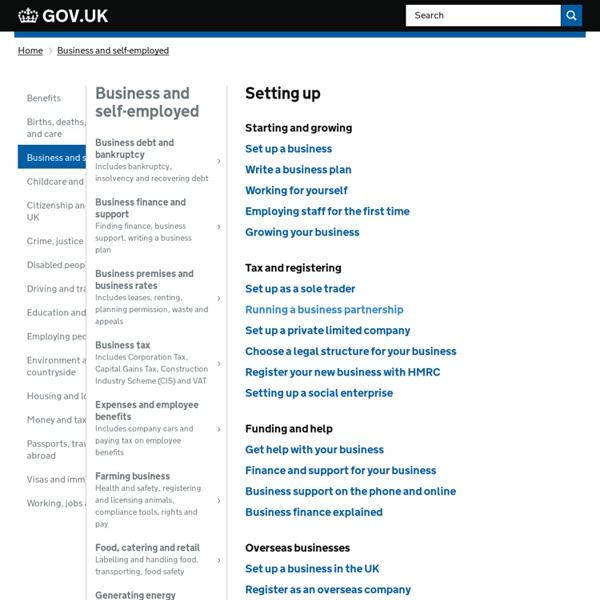



Home Main Body Text The Business and IP Centre Leeds is a one-stop source for all your business and intellectual property needs. We draw on a wide range of resources and have extensive experience in dealing with business and intellectual property enquiries. We are members of the Europe-wide PATLIB network, the British Library's Business & IP Centre network, and work closely with the West and North Yorkshire Chamber of Commerce and other partners. Business InformationWhether you are taking your first steps in setting up in business, targeting new customers, increasing your knowledge of competitors or looking for new partners or markets we have a wealth of information at our fingertips Protecting your products and services We can guide you through the procedures required to help you protect your products and services using patents, trade marks, registered designs and copyright
What Other Legal And Professional Requirements Might I Have To Comply With? | Insurance, Professional And Legal Requirements | Setting Up a Complementary Health Practice | Business | How To | Read Free Online Books at How To StartUp Britain: a living market-place for the wide range of enterprise support available on the web. Staff rota pricing and payment options » Findmyshift Limited to one week forward, one week backward and 5 staff members. Great for small teams.$0 per monthDrag & drop schedulingTimesheets & time clockUp to 5 staff membersEmail & text messagingShift remindersPayroll calculation1 week forward & backwardCreate a free rota »Unlimited staff and full access to all of the features. Perfect for all types of organisations.$35 per monthDrag & drop schedulingTimesheets & time clockUnlimited staffEmail & text messagingShift remindersPayroll calculationUnlimited accessTime off managementReal time-reportingTemplatesCustomisable databaseCustomisable filtersTry it free for 30 days »Unlmimited staff and all of the features, but half the price for charities and non-profits.$17.50 per monthDrag & drop schedulingTimesheets & time clockUnlimited staffEmail & text messagingShift remindersPayroll calculationUnlimited accessTime off managementReal time-reportingTemplatesCustomisable databaseCustomisable filtersTry it free for 30 days » Priced per rota.
10 Essential Online Tools for Your Startup Finding the tools you need when you first start a new business can be difficult, but luckily there are more and more web applications to ease some of that pain. You can take care of just about any challenge from designing your logo to even answering the phone … yes, via the Web. No longer are you shackled by what your locale offers you when you have the entire world at your fingertips. We’ve gathered up 10 of what we feel are the most essential tools for your business to use when you’re first getting started online. 99Designs: Choosing a designer for your logo, site, stationery, Twitter background and so on can be an extremely scary prospect. Amazon Web Services: Hosting and bandwidth costs are a quick way to run up bills for your company, but with Amazon Web Services (AWS), you get several solutions that are all pay-as-you-go. Dropbox: In the early days of a startup, you may be bouncing around on trips, between your home and office, multiple computers and so on.
Set up a business What you need to do to set up depends on your type of business, where you work and whether you take people on to help. Register your business Most businesses register as a sole trader, limited company or partnership. Sole traders It’s simpler to set up as a sole trader, but you’re personally responsible for your business’s debts. Find out more about being a sole trader and how to register. Limited companies If you form a limited company, its finances are separate from your personal finances, but there are more reporting and management responsibilities. Some people get help from a professional, for example an accountant, but you can set up a company yourself. Partnerships A partnership is the simplest way for 2 or more people to run a business together. You share responsibility for your business’s debts. Rules for your type of business You may have other responsibilities depending on what your business does. Check if you need: There are also rules you must follow if you: Where you work
The Chi Centre - Qi Gong Lessons & Healing. Undergraduate » Centre for Enterprise and Entrepreneurship Studies The Centre for Enterprise and Entrepreneurship Studies discovery modules (delivered as part of the University’s Enterprise & Innovation discovery theme1) are designed to help you to enhance many of the non-subject specific, transferrable skills that top employers are seeking in graduates. For example: Organisation & Planning – Adaptability – Team working – Leadership – Communication skills – Networking – Creative thinking – Negotiation – Innovative ideas – Enterprise skills To see how the Enterprise & Innovation modules can link together, download a module map here2. Discovery modules 2016/17 Enterprise, Entrepreneurship and Society Enterprise & Management Within these streams, modules are offered at three levels; please use the menu on the left to see the modules in each level. LUBS modules 2016/17 LUBS1890 Starting Your Own Business19 (Semester 1) At a time when competition for jobs is intense, developing such skills is one way to gain an advantage in the employment market.
Employment Law Services, Health and Safety at Work, Peninsula, UK CONNECT Yorkshire helps businesses in Yorkshire and the Humber get the funding and expertise they need.